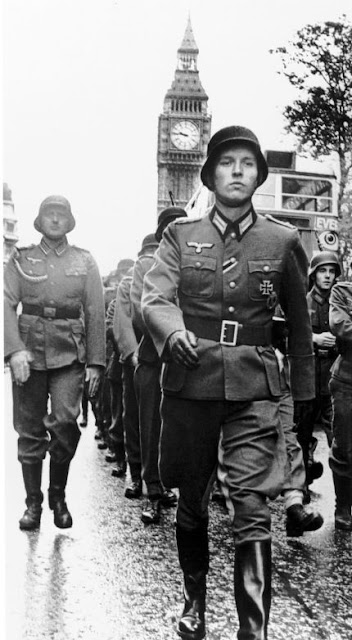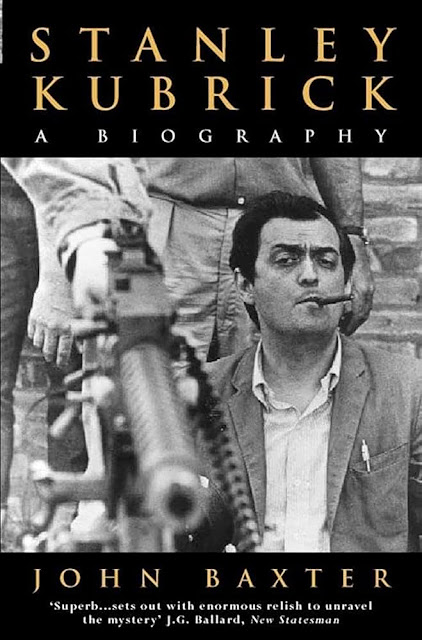Fortunately for the rest of Europe, Nazi Germany never succeeded in its efforts to invade Great Britain. Following the evacuation of the British Expeditionary Force from Dunkirk in France in 1940, a German invasion across the English Channel seemed to be imminent. But with the Germans unable to gain air superiority over southern England during the Battle of Britain, the plans for invasion had to be abandoned.
But the counterfactual "What If?" of a successful German invasion of Britain in World War II has turned up in books, TV series and films many times since then. Here are some of the times the Nazis did actually invade - at least in film and TV.
 |
| A scene from It Happened Here (1964) |
Miss Grant Goes to the Door (1940)
This short film was made in the early days of World War II, when the British population was steeling itself for the possibility of invasion. The film stars Mary Clare and Martita Hunt as two sisters dealing with Nazi spies and paratroopers in the first minutes of a German invasion. The film was sponsored by Britain's Ministry of Information and, in its brisk 7 minute running time, carries important official messages about how to behave in the event of invasion. Read more about the film here.
Went the Day Well? (1942)
This prototypical invasion thriller is set in the sleepy English village of Bramley End. The residents' peaceful existence is interrupted by the arrival of a unit of British soldiers. Unbeknown to the villagers though, the soldiers are actually German troops in disguise, and they are the advance guard of a German invasion force. Among the locals are Thora Hird, Harry Fowler and Leslie Banks. But who among them can really be trusted, and who is secretly working for the Germans?
This dark thriller was produced by Ealing Studios, and its violence belies the company's sometimes misleading reputation for cosiness. Went the Day Well? was also an obvious influence on the 1970s novel and film The Eagle Has Landed, which was based on a similar premise.
The Silent Village (1943)
This unusual film re-tells the story of the Nazis' massacre of the people of the Czech village of Lidice, as if it had happened in a small Welsh village. Running for 36 minutes, this wartime propaganda short was made by Britain's "film maker poet" Humphrey Jennings and was filmed in the mining village of Cwmgiedd in south Wales.
The Other Man (1964)
Although not dealing with an invasion exactly, this TV drama is based on an alternative history where Britain and Germany made peace in 1940. The two countries are now theoretically allies, but over time the Nazis have proved to be a corrupting influence. This film was part of the "ITV Playhouse" strand and stars Michael Caine, just when he was on the cusp of becoming a film star.
It Happened Here (1964)
A counterfactual history of World War II is presented in this docudrama, which follows the fortunes of a nurse (Pauline Murray) in Britain under Nazi occupation.
This remarkable amateur film was made over a period of seven years on a scrape-the-budget-together-as-you-go-along basis. The film's eye-catching shot of German soldiers marching past the Houses of Parliament has been reproduced many times since in the media.
It Happened Here was made by two young film makers, Kevin Brownlow and Andrew Mollo, who were both teenagers when production started. The pair would later make the 17th century historical drama Winstanley (1975) before going their separate ways. Kevin Brownlow would become a well known film historian, while Andrew Mollo became a military uniform consultant on historical films.
Submarine X-1 (1968)
Submarine X-1 features James Caan in an early starring role as a Royal Navy officer put in charge of a mission to sink a German battleship using midget submarines.
The submarines are based on the real Royal Navy 'X craft' of World War II, and the film's storyline is obviously inspired by the attack on the German battleship Tirpitz in 1943. That attack had previously been portrayed in the 1955 film Above us the Waves, starring John Mills.
Submarine X-1 is of interest for our purposes because of the scene where German soldiers are parachuted into Scotland to attack a British submarine base. Yes, really. The makers obviously felt that the story needed an extra action sequence early on, but if you were wondering if anything like that ever happened in real life, then obviously the answer is no.
The Mackenzie Break (1970)
Although not about a German invasion of Britain, this unusual prisoner of war film is also worth mentioning. The Mackenzie Break inverts the usual POW story of Allied prisoners of war trying to escape from a German camp. Instead, this film features a group of German prisoners trying to escape from a British prison camp, while Brian Keith and Ian Hendry are the officers trying to stop them.
Bedknobs and Broomsticks (1971)
Often forgotten by the history books is that time when the Nazis launched an invasion of Britain, but were beaten back by an army of suits of armour, magically brought to life by a local witch. This, of course, was in the family musical Bedknobs and Broomsticks, which must be the only Disney film to feature an attempted Nazi invasion of England.
The film follows three evacuee children who are sent to a village on the south coast of England. There they are to stay in the house of the eccentric Eglantine Price, played by Angela Lansbury. Eglantine is secretly a trainee white witch, who is learning witchcraft through a correspondence course (obviously).
The children, Miss Price and Emelius Browne (David Tomlinson), the man who sold her her spell books believing them to be useless, enjoy various adventures together involving magic, songs and animated sequences, all of them deliberately reminiscent of an earlier Disney hit, Mary Poppins.
In the film's finale, a German raiding party lands not far from Miss Price's cottage. Fortunately, she is able to use a magic spell to animate suits of armour from the local museum and uses this magical medieval army to drive the invaders back into the sea.
The Eagle Has Landed (1976)
The Eagle Has Landed features a German plot to kidnap British Prime Minister Winston Churchill. German paratroopers led by Colonel Steiner (Michael Caine), and assisted by Irish spy Liam Devlin (Donald Sutherland), infiltrate a village on the east coast of England disguised as Free Polish soldiers. Their plan is to seize Churchill when he arrives in the area to visit a bomber base nearby and then spirit him onto a German E-boat waiting off the coast.
This all-star wartime yarn also features Donald Pleasence, Jenny Agutter, Larry Hagman, Treat Williams and Anthony Quayle, and was based on the best-selling novel by Jack Higgins. Any debt owed to Went the Day Well? was strictly unacknowledged.
Donald Sutherland was back in Britain as another wartime German spy five years later in Eye of the Needle in 1981, based on the novel by Ken Follett.
An Englishman's Castle (1978)
This three part TV series is another counterfactual, this time set in a contemporary Britain that lost World War II in 1940 and has since become a satellite state of Nazi Germany. Kenneth More - a familiar star of British war films of the 1950s - plays a TV producer whose big hit is a soap opera called "An Englishman's Castle", which is set during the early years of the war. He has come to see "peace" (i.e. capitulation in 1940) as a victory rather than a defeat. But over the course of the series he has to face up to the realities of Nazi rule.
Hellboy (2004)
Hellboy is the first of two films directed by Guillermo del Toro and starring Ron Perlman as Hellboy, the demon employed by the US Government to combat supernatural forces.
Hellboy was originally summoned from Hell as part of a sinister Nazi experiment into the occult. For some reason, this experiment took place in Scotland, of all places. Why they needed to go to Scotland is anyone's guess, given that this was enemy territory to the Germans in the Second World War. But somehow they must have managed to sneak a few companies of soldiers into Britain undetected. Either that, or the film's writers were seriously confused about World War II.
Jackboots on Whitehall (2010)
This eccentric puppet fantasy is the work of the brothers Edward and Rory McHenry and uses Action Man (or G.I. Joe) type figures to tell the comic story of an alternative history of World War II, where the Nazis invade London. The impressive voice cast includes Ewan McGregor, Tom Wilkinson, Richard E. Grant, Stephen Merchant, Rosamund Pike and Dominic West.
In this unlikely alternative history, the Allied invasion of Normandy in 1944 has failed, and that has led to a German invasion of Britain. Apparently. In real life, the Germans couldn't invade in 1940, so a successful invasion in 1944, when Britain was packed with Allied armies and had almost total air superiority, seems distinctly unlikely.
Anyway, this film is based on a novel by Owen Sheers and is set in a remote Welsh valley, where the men all suddenly disappear one day to join the resistance movement. The local women, including farmer's wife Sarah (Andrea Riseborough), have to deal with and collaborate with the advancing Germans, led by Albrecht (Tom Wlaschiha), when they arrive.
SS-GB (2017)
SS-GB is based on Len Deighton's novel set in an alternative history in which the Germans won World War II. This television version was broadcast as a five part series, and starred Sam Riley as a British police detective in London under a Nazi occupation, who is drawn into a conspiracy against the Nazis.
The series was first broadcast in the UK on BBC1 in 2017 and was scripted by regular James Bond screenwriters Neal Purvis and Robert Wade from Len Deighton's 1978 novel.
Lola (2021)
This low budget sci-fi stars Emma Appleton and Stefanie Martini as two young Englishwomen in the '30s who invent a machine ("Lola") that can pick up TV broadcasts from the future. When war comes they use their advanced knowledge to warn others of impending aerial bombing - but, inevitably, it's not long before the British Government takes an interest in the technology as well.
With its new-found knowledge of the future, Britain has an enormous advantage over the Germans in the war. But time-meddling usually goes awry and a fake German signal tricks the British into sending the entire navy (!) to Southampton instead of Dover, where the Germans land effectively unopposed. Not only are the whole of the RAF apparently over Southampton as well, but the entire British Army must have been on their day off. The inevitable result is jackboots in London and a terrifying future of fascist pop music.
Lola begins with a moderately intriguing premise, but is not very plausibly developed, starting with an outlandish idea and managing to become ever more unlikely as it progresses.
_______
Of course, one part of British territory really did come under German occupation during World War II, the Channel Islands. Stories about the occupation of the Channel Islands are a whole different sub-genre, but notable examples include the films Appointment with Venus (1951) and The Guernsey Literary and Potato Peel Pie Society (2018), and the TV series Enemy at the Door (1978-80) and Island at War (2004).
Sci-fi thriller Philadelphia Experiment II (1993), the TV movie Fatherland (1994) and the television series The Man in the High Castle are all based on counter-factual histories where the Nazis won World War II, but are not set in Britain.



Comments
Post a Comment